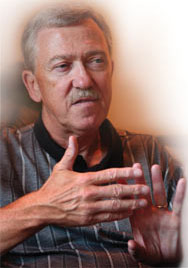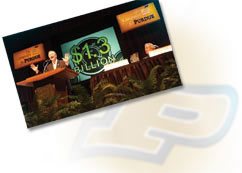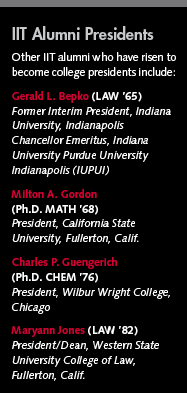
If not for the influence of an extraordinary educator, IIT alumnus and trustee Martin C. Jischke (PHYS ’63) might never have embarked on the path that led him to an outstanding career in academia, culminating in the presidency of Purdue University.
As a specialist in fluid dynamics with extensive knowledge in heat transfer, fluid mechanics, aerodynamics, and other technical areas critical to aircraft and spacecraft design, the doors to high-paying research jobs at private aerospace companies would have been flung wide open for him.
Instead, he met Judson Baron, a decorated World War II veteran who was a professor and researcher at Massachusetts Institute of Technology, where Jischke was pursuing his master’s degree.
“The single biggest factor in my decision [to enter academia] was this remarkable teacher,” Jischke recalls. “On my first day on campus, I went to his office because he was my graduate advisor. He signed me up for classes, including one of his on high-speed gas dynamics. He was a fabulous teacher and role model, and was quite an intellectual. After a few months, I decided to write my master’s thesis under him and then stayed to get my Ph.D.”
When Jischke earned his doctorate in 1968, he had opportunities to join Boeing and McDonnell Douglas. He decided to try teaching instead.
“First, I thought that being a professor, teaching students and doing research, was a noble enterprise and a way of contributing to society,” he explains. “Second, I enjoyed the freedom to pursue research interests in quite a few areas. Third, I thought it would be easier to go from a low-paying job to a high-paying job if I didn’t like being a professor. It turned out to be a great decision.”
Jischke graduated from Proviso High School (now Proviso East) in near west suburban Chicago and became the first member of his family to attend college when he entered IIT in 1959. In route to earning his degree in physics, Jischke was something of a big man on campus. He was president of his class, ran the Union Board, worked as a radio announcer at sporting events, and even organized IIT’s first homecoming event. His affection for the university would lead Jischke to return as a trustee more than 40 years after graduating.
“The fact that I’ve been the president of four institutions gives me a background of knowledge and experience that is helpful to the rest of the board,” he says. “I hope I can help the board better understand the issues facing IIT and how we might address them.”
Gerald L. Bepko (LAW ’65), a graduate of IIT Chicago-Kent College of Law and himself a former interim president of Indiana University, believes Jischke would be an asset on any board.
“If you put him into almost any leadership role, he would figure out how to lead the people and the organization,” Bepko says. “He’d introduce the right values; help develop the mission, vision, goals, and objectives; and then execute on them. He’s a very formidable leader.”
After leaving MIT, Jischke spent six years teaching at the University of Oklahoma and becoming a tenured professor. In 1974, he was eligible for a sabbatical, where he could either attend Harvard University, Oxford University, or Imperial College, or accept a White House fellowship. He chose the latter, working for a year as a special assistant to William T. Coleman, the secretary of transportation.
The White House experience was a critical juncture in his evolution. “I learned a lot about myself and government and what I might do with my life,” Jischke says. “I spent a lot of time thinking about the next 30 years or so. I decided after that to get on the track to more leadership and administrative roles. I knew I wanted to be a university president.”

He returned to Oklahoma, where he became a department head and began the arduous task of schooling himself in areas critical to being an effective university president. He studied public speaking and fundraising. He read heavily about the broader issues affecting higher education and scanned the Harvard annual report. He followed the writings and careers of several presidents, including those at Oklahoma, the University of Michigan, and Princeton University.
“They had a broader view of the role of higher education in the world,” Jischke explains. “It wasn’t narrowly the teaching of young people and doing research. They saw higher education as tools by which better societies were developed.”
Other common traits were the ability to communicate clearly and passionately, whether through public speaking or position papers, and an understanding of finances and fundraising. “Financial resources are inevitably a factor in achieving the broader mission,” he explains. “When it’s all said and done, the best universities tend to be the best-financed universities.”
After a total of 17 years at Oklahoma—including five years as dean of the College of Engineering—he became the university’s interim president in 1985. In 1986, he was named chancellor of the University of Missouri–Rolla, and in 1991 became president of Iowa State University.
At both schools, Jischke beefed up scholarship programs and set new records for fundraising.
His successes at those colleges led to his high-profile presidency at Purdue. Arriving in 2000 as the school’s 10th president, he set an ambitious agenda from the start, aiming to transform Purdue from a great university into a preeminent university while strengthening its ties to the larger economy in Indiana.

Jischke launched a five-year plan including a capital campaign that raised more than $1.7-billion and more than 50 capital projects. The centerpiece of the building initiative was Discovery Park, a $400 million interdisciplinary hub focusing on everything from biosciences to manufacturing to health-care engineering. He also added 300 new faculty members with a strong emphasis on science and engineering.
A passionate advocate for attracting more American students to engineering, he was chosen by President George W. Bush for a seat on the President’s Council of Advisors on Science and Technology in February 2006.
“Science and technology affect our country in so many ways, from its economic competitiveness to national security to the strength of its educational systems,” Jischke says. “It’s a very, very important area for national policy and national investments.”
The council has devoted much of its time toward energy issues including the need to transition away from traditional fossil fuels, he explains.
It also has studied the American research and development system, and science and technology issues affecting personalized medicine.
“These are all issues of great importance to the country,” he adds. “It’s been a great honor to work with these very distinguished Americans to provide the president with carefully considered advice.”
Jischke backed his passion for science with initiatives that put a Purdue education within reach for more talented students. He led an effort to create a new program to offer need-based scholarships to Purdue in each of Indiana’s 92 counties and launched an effort to provide eligible graduates of the Indianapolis school system with four-year scholarships if they pursued a science-related major.
“Top-notch research facilities attract good faculty. Faculty, in turn, attract good students,” says J. Timothy McGinley, chair of the Purdue Board of Trustees, who notes the university recently named a biomedical engineering building for Jischke. “Martin was very successful at raising so much money, but it was all raised in service of a strategic plan on where to invest. A good part of the funds have gone into scholarships.”
At IIT, Jischke chairs the board’s Academic Committee. Friends and colleagues say he brings more than an educator’s background to the board.
“Martin understands we have a crisis in this country getting men and women into engineering,” says Peter Magrath, president of West Virginia University. “He knows we must get students energized and excited about math and science. They must be inspired, so they go to a great engineering college like IIT.”
Since leaving Purdue, Jischke has barely slowed down. In addition to the IIT board, he serves on the board of Wabash National Corporation, a manufacturing firm in Lafayette, Ind.; Duke Realty Corporation, a real-estate investment trust based in Indianapolis; and Vectren Corporation, a utility firm based in Evansville, Ind.
Additionally, he’s involved in charitable work and has been consulting on higher-education issues in Ireland, Saudi Arabia, and Taiwan.
“Education is as important and powerful a tool for societal progress as it has ever been,” Jischke says. “Our ability to solve problems, to create opportunities, and to understand the world around us all hinge on education.”